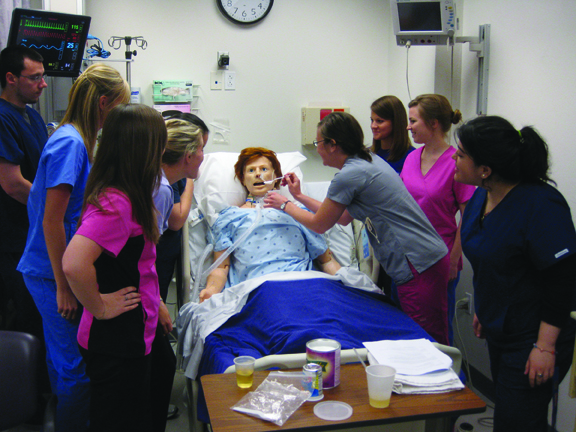Reaction time
Speech pathology students get prepared for hospital training in a simulated ICU setting.

Students get hands-on experience treating “Mr. Stephens.”
Reaction time
Speech pathology students get prepared for hospital training in a simulated ICU setting.
Graduate student Noelle Boyd had never been in an intensive care unit before, and she didn’t know what to expect. But after it was over, she said it was an experience she wouldn’t trade.
Boyd wasn’t sick, though, and the ICU was only a simulation of the real thing. It was a learning experience for her and eight classmates in Christopher Watts’ graduate-level medical speech/language pathology course. Watts, professor and chair of the Department of Communications Sciences and Disorders, believes the simulation is a ground-breaking experience not only for his students but in the larger world of academia.
“The two main places where our graduates work are schools and medical settings such as hospitals,” Watts says. Yet most fledgling speech pathologists aren’t educated about the ICU environment with all its intimidating machines, wires and tubes.
To remedy that, Watts enlisted Ashley Franklin in the nursing college to set up a life-size model ICU room, complete with ventilation machine, vital-signs monitors and intravenous (IV) drip. And most important, a fake patient, a manikin named “Mr. Stephens.”
The goal was for the students to get familiar with a setting where their careers are likely eventually to lead them.
Mr. Stephens had suffered a stroke and was experiencing difficulty swallowing. The students gathered around the bed to watch him be evaluated for his ability to drink liquids. He obligingly participated in three scenarios: one with a breathing tube (tracheostomy) in his neck and a ventilation machine; one with tracheostomy and no ventilation; and one in which the students had to “gown up” before entering his room, as he had contracted a serious infection.
“The simulation was extremely useful,” says Boyd, of Arlington. “I hadn’t been in an ICU before. I’m working at HealthSouth Rehabilitation Hospital this summer, but they don’t have an ICU.”
Now that she and her classmates have learned the names and functions of ICU devices, “we won’t feel overwhelmed,” Boyd says. “We’re lucky Dr. Watts allowed us to have this experience. He prides himself on giving us experience we can’t get anywhere else.”
Says Watts: “The goal is to make this a permanent part of the curriculum, an activity for every graduate before ‘externing.’ We want them to feel comfortable enough to focus on the patient — not on all the bells and whistles in the room.”
The swallowing evaluation is important in speech and language treatment because, “as speech pathologists, we work with patients on their functions from the neck up,” says Boyd. Also, the ability to swallow and to eat normally, “affects the patient’s outlook on life and their motivation to improve their ability to speak.”
The demand for speech pathologists is growing at both extremes of the age continuum, says Watts. As the population ages, after-stroke care is increasingly important. And survival of more premature babies means more young children need speech therapy.
Meanwhile, Mr. Stephens is being given something to drink. He “coughs” (actually it’s Franklin who supplies the cough), and the monitors show that he’s in trouble. It’s an emergency.
The students are asked, “How do you react?”
The right answer: Use the call button to summon help from the nurses’ station.
After two minutes there’s no response.
“Now what do you do?”
Exactly what you’d think: Stick your head out the door and yell for help.
It seems so natural, and yet, “it’s probably the first simulation in the nation for speech/language pathologists to enter the room and know what all the equipment is and how to interact with nursing staff,” says Watts.
He and Franklin, who is the clinical lab instructor for simulation, want to share this innovation with people around the world at future conferences and perhaps publish a tutorial article. There’s no word yet on whether Mr. Stephens will be well enough to accompany them.

Your comments are welcome
Comments
Related Reading:
Features
Infographic: Minors
A wide variety of minors gives TCU students the chance to add depth to their majors or dive into new areas.
Features
Venture Capitalism 101
MBA students connect investors and startups in a Neeley program.